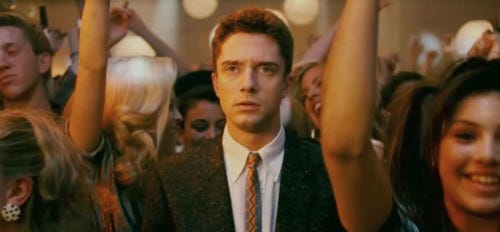Take Me Home Tonight

A decade’s collective attitude is directly correlated to the popular drugs of the era. At least in movies, that is. Movies about the 1970s (e.g., “Dazed and Confused”) feature people mellowed out on marijuana, oblivious about tomorrow. In 1980s movies, like “American Psycho” and “Take Me Home Tonight,” characters are ever-moving animals amped up on cocaine — and the pressure to be impressive. It feels strange and ironic to look back on this time in which people were obsessed with looking forward. Such is the experience of seeing “Take Me Home Tonight.”
That’s not to say this movie is unpleasant. In fact, it is a fun, charming ride — one that highlights the positives of the '80s and downplays the negatives.
Topher Grace stars as rudderless MIT graduate Matt Franklin. Uninterested in a monotonous career of monetary success, Matt spends his days at Suncoast Video, looking for his dreams between the shelves. In the process, he stumbles upon his old high school crush, Tori Frederking (Teresa Palmer). In the hopes of winning her affections, he tells her that he works as an investment banker at Goldman Sachs and follows her to a couple of parties — social gatherings he usually avoids.
Matt is essentially the older version of Grace’s character in “That ’70s Show.” Of course, that figures, considering the film is based on a story by Grace and Gordon Kaywin and written by regular “ ’70s Show” scribes Jackie and Jeff Filgo. The major difference between this film and “That ’70s Show” is the injection of raunch and heavy drug use. In fact, the film was shelved for four years because Universal Studios did not know how to handle or promote a youthful comedy filled with so much indiscretion. But beneath the film’s coke-smeared exterior is a big, beating heart.
“Take Me Home Tonight” is a tender, nostalgic embrace of the ’80s filled with characters determined to have a good time (which the film provides). Some of them misstep with drugs and romance — namely Matt’s slovenly friend, Barry (played to comedic perfection by Dan Fogler) and his doting sister, Wendy (sensitively portrayed by Anna Faris). In the end, though, these characters — and the viewers — are left smiling.
Unlike many other ’80s party movies, “Tonight” cuts through the excess. Director Michael Dowse keeps the camera focused on the characters rather than the chaos around them. Like Grace’s character, Dowse is wisely unconcerned with the glossy surface of the decade, opting instead to evoke its emotions. He dwells on wholesome characters like Matt and dodges (or at least spends little time with) the money-obsessed, power-hungry yuppies that surround him.
In the end, “Tonight” is like Matt Franklin himself — sincere, upbeat, and hopeful. Topher Grace is the heart and soul of the film — an actor whose innocence and charisma is as needed and refreshing as it would have been in the ’80s, the era of excess.


